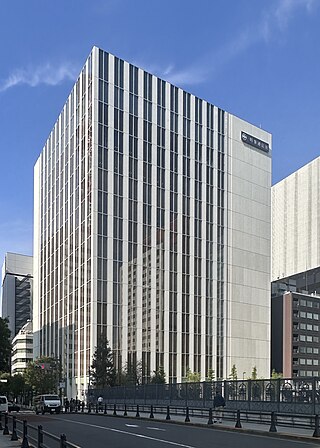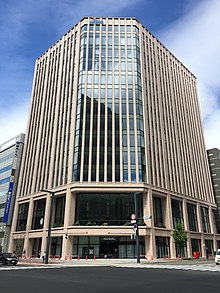
Hudson Soft Co., Ltd. was a Japanese video game company that released numerous games for video game consoles, home computers and mobile phones, mainly from the 1980s to the 2000s. It was headquartered in the Midtown Tower in Tokyo, with an additional office in the Hudson Building in Sapporo.

Irem Software Engineering is a Japanese video game console developer and publisher, and formerly a developer and manufacturer of arcade games as well. The company has its headquarters in Chiyoda, Tokyo.

Monolith Software Inc., trading as Monolith Soft, is a Japanese video game development studio originally owned by Namco until being bought out by Nintendo in 2007, best known for the Xenoblade Chronicles series of games. The company was founded in 1999 by Tetsuya Takahashi with the support and cooperation of Masaya Nakamura, the founder of Namco. Their first project was the Xenosaga series, a spiritual successor to the Square-developed Xenogears. Multiple Square staff would join Takahashi at Monolith Soft including Hirohide Sugiura and Yasuyuki Honne.
1-Up Studio Inc., formerly Brownie Brown Inc., is a Japanese video game developer founded on June 30, 2000, in Tokyo, Japan by Shinichi Kameoka and Kouji Tsuda who worked on the Mana series. The studio developed games for both Nintendo and Square Enix, including Magical Vacation and Sword of Mana.

Hakuhodo DY Holdings Inc. (株式会社博報堂DYホールディングス) is a Japanese advertising holding company that owns Hakuhodo, Daiko, and Yomiko Advertising. It is the second largest advertising company in Japan, following Dentsu. Its headquarters are located in Akasaka, Minato, Tokyo.

AlphaDream Corporation, Ltd. was a Japanese video game development company founded in 2000 by Tetsuo Mizuno and Chihiro Fujioka in Tokyo, Japan. In partnership with Nintendo, it produced software for the Game Boy Color, Game Boy Advance, Nintendo DS, Nintendo 3DS, and Nintendo Switch, including the Mario & Luigi series. The company's staff included former developers from Square, such as Yoshihiko Maekawa. On October 1, 2019, AlphaDream was shut down after filing for bankruptcy, and on February 28, 2020, AlphaDream ceased to exist as a company.
Artoon Co., Ltd. was a Japanese video game developer established in 1999. It became a subsidiary of AQ Interactive in May 2004 and became a wholly owned subsidiary in June 2005. The team was primarily affiliated in the United States with Microsoft Xbox and Xbox 360 projects, although they had also worked with Hudson Soft and Nintendo on other platforms.

A kabushiki gaisha or kabushiki kaisha, commonly abbreviated K.K. or KK, is a type of company defined under the Companies Act of Japan. The term is often translated as "stock company", "joint-stock company" or "stock corporation". The term kabushiki gaisha in Japan refers to any joint-stock company regardless of country of origin or incorporation; however, outside Japan the term refers specifically to joint-stock companies incorporated in Japan.

Dentsu Inc. is a Japanese international advertising and public relations joint stock company headquartered in Tokyo. Dentsu is currently the largest advertising agency in Japan and the fifth largest advertising agency network in the world in terms of worldwide revenues.

AQ Interactive, Inc. was a Japanese video game developer and publisher. AQ stands for Artistic Quality. It was the parent company of the developers Artoon, Cavia and feelplus, and most recently the U.S. publisher Xseed Games. AQ Interactive and its subsidiaries produced games both under the AQ Interactive name, as well as developing for other publishers such as Microsoft Studios and Nintendo.

SETA Corporation was a Japanese computer gaming company, founded on October 1, 1985 and dissolved on February 9, 2009. SETA was headquartered in Kōtō, Tokyo, with a branch in Las Vegas, Nevada.

Marvelous Entertainment Inc. (MMV) was a multinational corporation that produced animation, music, video games and television series. MMV is known for its involvement in the Story of Seasons series. They merged with AQ Interactive in 2011 and became Marvelous AQL; the "AQL" was dropped later on.

Jiji Press Ltd. is a news agency in Japan.

iXIT Corporation, formerly known as Index Corporation, is a Japanese corporate information and communications technology company owned by Sawada Holdings.
Good-Feel Co., Ltd. is a Japanese video game developer. Good-Feel started in Hyogo, Japan, in 2005 and opened a production facility in Tokyo in the same year. Their main focus had been educational games for the Nintendo DS, which were released solely in Japan. The games, the first of which was released in 2007, consist of primers for young children and English language training for kids and adults.

DeNA Co., Ltd. is a Japanese provider of mobile portal and e-commerce websites headquartered in Shibuya, Tokyo. It owns the Mobage platform, which is one of the most popular cell phone platforms in Japan. It also operates many other services, including a popular e-commerce website DeNA Shopping.

Paon DP Co., Ltd. (株式会社パオン・ディーピー) is a Japanese video game developer. The company was founded in August 2004 as DP Inc. and merged with Paon Corporation, Ltd. in March 2015 to form Paon DP.

Cygames, Inc. is a Japanese video game development studio established in 2011 by CyberAgent. Mobile and e-commerce company DeNA acquired a 24% stake in the studio in 2012, and Nintendo acquired another 5% stake in 2018, leaving CyberAgent with 69% of the shares and as such, they are the parent company of Cygames. From its formation, the company produced mobile games, initially on the Mobage platform, and from 2013 on Android and iOS. The company headquarters is located in Tokyo while other divisions are located in Osaka and Saga in Japan and Seoul, South Korea.















